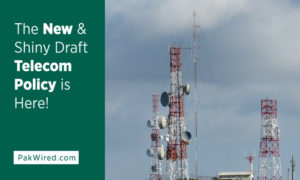The government has recently released a draft telecom policy 2016. It seems to be a mish-mash of clichés that we think delve on everything but the oppressive tax policy and the double taxation, especially on data services.
The issue of taxation is one of the most important as it directly affects the end user as they have to bear the brunt of increased taxation. Taxes really take a toll on the consumer, especially those in the lower strata and if this issue is not addressed it will definitely hamper the growth of the sector.
This new draft policy does not say a thing about any kind of tax relief to the telecom sector. There are multiple taxes that add on to the services:
- There is the 20% GST
- Followed by the 14% withholding tax on mobile services
- There is a corporate tax of 32% that the mobile operators have to dish out
- And finally there are province-wise additional taxes imposed by provincial governments on broadband services
- Oh, and operators also have to pay several other taxes such as:
- Sales tax on issuance of SIM cards
- SIM activation tax of Rs250 and
- The IMEI-tax for activation of handsets
The policy has also ignored the telecom operators’ request to grant them industry status which could reduce their net tax bill.
In the end, no matter how things play out, all these taxes fall on the consumer (you and me!).
PTA’s will have an environmental regulatory role
The policy also fosters PTA’s absolute control by mandating it to create an environmental regulatory framework that would set targets for telecom operators.
This comes on the back of orders from the National Assembly Standing Committee on IT and Telecom to the PTA to get mobile operators to convert their base stations to solar power.
This again seems like a half backed solution as forcing operators to do this might instead just create a problem.
It is proven that a 4 grams/square meter dust layer reduces the efficiency of solar panels by approximately 40% and if not implemented properly this could just result in escalating operational and maintenance overhead costs for operators. And as a universal rule, rising costs are eventually in one way or the other passed on to customers.
Universal Service Fund will continue its broadband rollout plan
As is evident, Pakistan is nowhere to be seen in the global broadband race. This has reached catastrophically proportions in the rural areas.
However, Billions of rupees have already been distributed by the Universal Service Fund (USF) to correct this imbalance. Funds have been disbursed to PTCL, Wateen and Telenor to help them introduce data services in rural and economically less-developed areas.
Creating a PTA & PEMRA nexus
The draft policy also wants more coordination between PTA and PEMRA to bridge the communication gap and to impose content regulatory measures. However, there is no strategic roadmap to this effect from the Ministry of IT as there can be quite a few legal hurdles in this regard.
This policy currently only expresses interest on the part of PEMRA and PTA so that they can carry out legal studies to come up with an actionable plan.
Rules set for competition
The Ministry of IT has also expressed interest in creating a separate set of ‘competition rules’ for the telecom companies. The idea behind this is to show a continuing commitment to encourage sustained FDI with up to 100% foreign equity.
We also see a possibility that the merger and acquisition rules could be relaxed in the near future to allow further consolidation in the telecom sector.
To Summarize
Currently the government policy seems to be to milk this sector till it runs dry. Although we are not against taxation, it should be kept in mind that taxation within reason should not only help institutions but also promises growth.
Currently we do not see a revolution in the rollout of broadband services anytime soon in the country and the new policy does not really give us any new hope as well.


